Traian Băsescu facts for kids
Quick facts for kids
Traian Băsescu
|
|
|---|---|
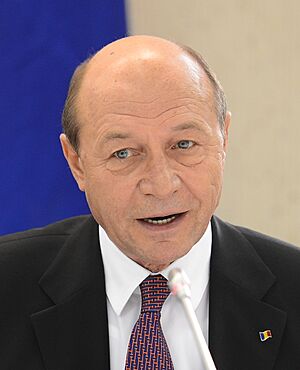
Băsescu in 2013
|
|
| President of Romania | |
| In office 20 December 2004 – 21 December 2014 |
|
| Prime Minister | Adrian Năstase Eugen Bejinariu (acting) Călin Popescu-Tăriceanu Emil Boc Cătălin Predoiu (acting) Mihai Răzvan Ungureanu Victor Ponta |
| Preceded by | Ion Iliescu |
| Succeeded by | Klaus Iohannis |
| Member of the European Parliament for Romania |
|
| In office 2 July 2019 – 15 July 2024 |
|
| Member of the Senate for Bucharest |
|
| In office 20 December 2016 – 19 June 2019 |
|
| Leader of the People's Movement Party | |
| In office 27 March 2016 – 16 June 2018 |
|
| Preceded by | Eugen Tomac |
| Succeeded by | Eugen Tomac |
| Leader of the Democratic Party | |
| In office 19 May 2001 – 18 December 2004 |
|
| Preceded by | Petre Roman |
| Succeeded by | Emil Boc |
| Mayor of Bucharest | |
| In office 26 June 2000 – 20 December 2004 |
|
| Preceded by | Viorel Lis |
| Succeeded by | Adriean Videanu |
| Minister of Transport | |
| In office 17 April 1998 – 26 June 2000 |
|
| Prime Minister | Radu Vasile Alexandru Athanasiu (Acting) Mugur Isărescu |
| Preceded by | Anton Ionescu |
| Succeeded by | Anca Boagiu |
| In office 12 December 1996 – 11 February 1998 |
|
| Prime Minister | Victor Ciorbea |
| Preceded by | Aurel Novac |
| Succeeded by | Anton Ionescu |
| In office 30 April 1991 – 19 November 1992 |
|
| Prime Minister | Petre Roman Theodor Stolojan |
| Preceded by | Doru Pană |
| Succeeded by | Paul Teodoru |
| Member of the Chamber of Deputies from Vaslui County |
|
| In office October 1992 – 14 November 2000 |
|
| Personal details | |
| Born | 4 November 1951 Basarabi, Romania (now Murfatlar) |
| Citizenship | Romania Moldova (2016–17) |
| Political party | People's Movement Party (2015–present) |
| Other political affiliations |
Romanian Communist Party (Before 1989) National Salvation Front (1989–1993) Democratic Party (1993–2004) Independent (2004–2014, PD/PDL membership suspended while president) |
| Spouse |
Maria Andrușca
(m. 1975) |
| Children | 2, including Elena |
| Education | Mircea cel Bătrân Naval Academy |
| Signature |  |
| a. Suspended from 20 April 2007 – 23 May 2007 (Nicolae Văcăroiu as acting president) and from 10 July 2012 – 28 August 2012 (Crin Antonescu as acting president). | |
Traian Băsescu (born 4 November 1951) is a Romanian politician. He was the president of Romania from 2004 to 2014. Before becoming president, Băsescu was Romania's minister of transport several times between 1991 and 2000. He also served as the Mayor of Bucharest from 2000 to 2004. In 2001, he became the leader of the Democratic Party (PD).
As leader of the Democratic Party, he helped form the Justice and Truth Alliance (DA) with the National Liberal Party (PNL). When Theodor Stolojan stepped down from the 2004 presidential race, Băsescu became the alliance's candidate. After winning the election, he stopped being a member of his political party because Romanian law doesn't allow the president to be part of a political party. He was re-elected president in 2009.
During his time as president, Romania joined the European Union on January 1, 2007. He is the only Romanian president to have been temporarily removed from office by the parliament twice, in 2007 and 2012. After his presidency ended, Băsescu joined the People's Movement Party (PMP) in 2015 and became its president in 2016. He later served as a Member of the European Parliament for Romania from 2019 to 2024.
Contents
Early Life and Family
Traian Băsescu was born in Basarabi, a town near Constanța, a major port city in Romania. His father, Dumitru, was a retired army officer, and his mother, Elena, was a homemaker. He has a brother named Mircea.
Băsescu and his wife, Maria, have two daughters: Ioana, who is a notary, and Elena, who was also a Member of the European Parliament.
Professional Career Before Politics
Băsescu finished his studies at the Naval Institute in Constanța in 1976. He then became a deck officer for Navrom, a Romanian state-owned shipping company. From 1981 to 1987, he worked as a captain on Romanian commercial ships.
In 1984, he became the captain of the Biruința, which was the largest ship in Romania's commercial fleet at the time. In 1989, Băsescu moved to Belgium to lead the Navrom office in Antwerp.
During his career, some people questioned his connections to the Securitate, which was the secret police during the communist era in Romania. Băsescu said his connections were very small, but some contact was necessary for people working in important jobs abroad back then.
Early Political Steps
Before 1989, Băsescu was a member of the Romanian Communist Party. He later said he joined the party to help his career in the merchant navy. After the Romanian Revolution in 1989, when communism fell, he entered politics. He joined the National Salvation Front (FSN) party.
Political Career Highlights
Minister of Transport Role
In April 1991, Băsescu became the minister of transport. He held this job in different governments until November 1992. In 1992, the FSN party split, and Băsescu joined the Democratic Party (PD). He was elected to the Romanian Parliament's lower house, the Chamber of Deputies, in 1992 and again for the 1996–2000 term.
From November 1996 to June 2000, he served as minister of transport again in several governments. During this time, he was involved in a public disagreement with Prime Minister Victor Ciorbea, which led to Ciorbea's resignation.
As minister of transportation, Băsescu oversaw the sale of Romania's merchant fleet (many ships). Some people thought the ships were sold for too little money, and this became known as "The Fleet File Affair." Prosecutors looked into the matter, but it was not proven that he did anything wrong. The case was closed for a while but reopened later. In 2007, the National Anti-corruption Directorate decided to end the investigation, saying there was no harmful dealing.
Mayor of Bucharest Role
In 2000, Băsescu was elected mayor of Bucharest, the capital city of Romania. He won by a small number of votes.
As mayor, he worked to reduce the number of stray dogs in the city. The number of stray dogs went down a lot, and so did the number of dog bite injuries. This campaign was controversial because many people disagreed with putting down so many dogs. He also said he improved the city's water and lighting systems and modernized public transportation.
His time as mayor was often difficult because he had many disagreements with the government, which was controlled by a different political party. These disagreements sometimes caused delays in projects to improve the city.
In 2003, Băsescu bought an apartment from the state. This caused a public discussion because of how the purchase was made and the price. Prosecutors investigated the matter and concluded that he did not break the law when he bought the apartment.
Leading the Justice and Truth Alliance
In 2001, Băsescu became the leader of the Democratic Party (PD). In 2003, he helped create an alliance with the PNL called the Justice and Truth Alliance. This alliance aimed to work together in elections and in Parliament.
The alliance focused on economic freedom, suggesting a simpler tax system. In 2005, the Financial Times newspaper described the alliance as "centrist," meaning it was in the middle of the political spectrum.
Presidential Campaigns
2004 Presidential Race
After Theodor Stolojan unexpectedly withdrew from the 2004 presidential elections, Băsescu became the candidate for the Justice and Truth Alliance. His main opponent was the prime minister at the time, Adrian Năstase. Băsescu won the election by a small margin, getting 51.23% of the votes. He won by talking about fighting corruption and being against communism. In a TV debate, he famously said that Romania's biggest problem was having to choose between two former Communist Party members.
2009 Presidential Race
Băsescu ran for a second term as president in 2009. He promised to cut government spending and help people in the countryside. He presented himself as someone fighting for ordinary people against "corrupt political leaders." He also suggested reducing the number of lawmakers in Parliament, which was a popular idea.
In the first round of the election, Băsescu came in first. In the second round, he won against Mircea Geoană by a very small difference. During the campaign, a video from 2004 appeared, showing Băsescu appearing to push a 10-year-old boy. Băsescu said he didn't remember the incident and later said he had never hit a child. The boy later said Băsescu had pushed him after he chanted a slogan for other politicians, but he wasn't hurt.
Presidency (2004–2014)
| Presidential styles of Traian Băsescu |
|
|---|---|
 |
|
| Reference style | Președintele (President) |
| Spoken style | Președintele (President) |
| Alternative style | Domnia Sa/Excelența Sa (His Excellency) |
When Băsescu became president, he promised reforms and to fight corruption. His victory was sometimes called Romania's "Orange Revolution" because of the orange color used by his alliance and similar events in Ukraine. As required by law, he stopped being a member of his political party.
He appointed PNL leader Popescu-Tăriceanu as prime minister. They formed a government with other parties to have enough support in Parliament.
Domestic Policies
Băsescu often said he was fighting against corruption among high-level officials. In 2005, Romania successfully resolved a situation where three Romanian journalists were taken hostage in Iraq.
He also pushed the government to help thousands of Romanians who lost their homes due to widespread flooding in 2005.
On December 18, 2006, Băsescu gave a speech to Parliament where he officially spoke against Romania's communist government that existed before 1989.
Foreign Policies
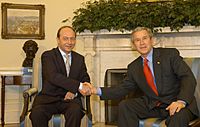
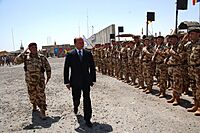
Băsescu always said that Romania joining the European Union was a top goal, and it happened on January 1, 2007. He also focused on having a strong partnership with the United States. This meant keeping Romanian troops in Afghanistan and a smaller group in Iraq. Romania also agreed to let U.S. troops use a military base in the country.
In June 2006, Băsescu disagreed with his prime minister about whether to withdraw Romanian troops from Iraq. Băsescu wanted them to stay, and they did.
Băsescu also worked to improve Romania's relationship with Moldova. He often said he believed the two countries might unite in the future, either politically or within the European Union. In June 2016, he and his wife were granted Moldovan citizenship, but this was later taken away in January 2017.
Romania ended its military mission in Iraq on June 4, 2009, and its troops left the country.
Disagreements with Prime Minister Tăriceanu
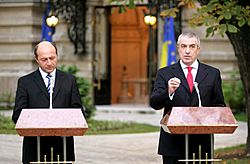
Băsescu was quite popular because of his direct style. He had promised to be a "player-president," meaning he would be very involved in politics, not just a mediator. After he became president, his relationship with Prime Minister Popescu-Tăriceanu became difficult. They often disagreed, and this became a major part of Romanian politics after 2004. The Romanian Constitution says the president appoints the prime minister but cannot fire him.
There was a public disagreement when a presidential adviser said that Prime Minister Tăriceanu had sent Băsescu a "scandalous" note about a company being investigated. Băsescu said the prime minister wanted a partnership that would involve "oligarchies" (powerful business groups), which he found unacceptable. The prime minister denied this and accused Băsescu of helping companies close to him.
Parliament's Vote to Suspend the President
In early 2007, members of the opposition parties tried to remove Băsescu from office, saying he acted against the Constitution. They accused him of interfering with the government, the justice system, and Parliament, and of favoring his own political party.
Băsescu and his supporters said his actions were meant to fight corruption and powerful business interests. The Constitutional Court of Romania said there was no clear proof he broke the Constitution. However, the Parliament still voted to suspend him on April 19, 2007.
2007 Vote on President's Removal
Because Parliament voted to suspend him, a national vote (referendum) was held on May 19, 2007, to let people decide if he should be removed from office. For him to be removed, a majority of all Romanians who could vote had to vote against him.
Băsescu first said he would resign if Parliament voted to suspend him, but then he decided not to, to avoid more political problems. In the end, only about 25% of voters voted to remove him, while 75% voted for him to stay. So, Băsescu returned to his job as president on May 24.
2012 Vote on President's Removal
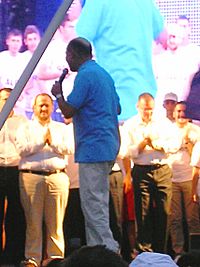
Băsescu was suspended by Parliament a second time on July 6, 2012, and another public vote was held on July 29, 2012. Most people who voted (88.7%) voted against his leadership. However, not enough people participated in the vote for it to be valid (less than 50% of all eligible voters).
The Romanian Constitutional Court later said the vote was not valid, and Băsescu was reinstated as president. After returning to office, Băsescu said it was time to put old disagreements aside and work on Romania's problems.
After the Presidency (2014–Present)
On October 9, 2015, Băsescu joined the People's Movement Party (PMP) and was elected its president.
In 2016, he ran for mayor of Bucharest again but later withdrew. In the 2016 elections for Parliament, Băsescu won a seat as a senator for Bucharest. He stepped down as PMP leader in 2018 but was elected honorary president of the party.
Involvement in Moldovan Politics
After being granted Moldovan citizenship in 2016 (which was later taken away), Băsescu was also made honorary president of the National Unity Party in Moldova.
Recent Elections
Băsescu ran for mayor of Bucharest again in the 2020 local elections. He finished in third place.
In the 2025 Romanian presidential election, Băsescu supported Nicușor Dan's campaign. Dan won the election and Băsescu attended his inauguration as president on May 26, 2025.
Health Updates
Băsescu has had several health procedures. In May 2006, he had surgery for a back problem. In September 2007, he had routine thyroid surgery. In March 2022, he was hospitalized in Brussels for medical issues. In January 2024, he was hospitalized for a lung virus. In June 2025, he had planned heart surgery in Paris.
Relationship with the Press
Băsescu has often been criticized by the media, and he has used strong words to describe some journalists who were critical of him.
In 2007, during a private conversation that was recorded, he used an inappropriate and offensive word to describe a journalist. His spokesman later expressed regret. Romania's National Council for Combating Discrimination decided that the expression was discriminatory and gave Băsescu a warning.
In 2008, he called another journalist a "jukebox on euros," which was a critical way to describe him. During the 2009 presidential election, Băsescu released video clips that made fun of journalists who criticized him.
Honours
Foreign Honours
 Azerbaijan: Recipient of the Heydar Aliyev Order (18 April 2011)
Azerbaijan: Recipient of the Heydar Aliyev Order (18 April 2011) Estonia: Collar of the Order of the Cross of Terra Mariana (6 April 2011)
Estonia: Collar of the Order of the Cross of Terra Mariana (6 April 2011) Finland: Grand Cross with Collar of the Order of the White Rose of Finland (2008)
Finland: Grand Cross with Collar of the Order of the White Rose of Finland (2008) Italy: Knight Grand Cross with Collar of the Order of Merit of the Italian Republic (7 September 2011)
Italy: Knight Grand Cross with Collar of the Order of Merit of the Italian Republic (7 September 2011) Latvia: Commander Grand Cross with Chain of the Order of the Three Stars (28 February 2011)
Latvia: Commander Grand Cross with Chain of the Order of the Three Stars (28 February 2011) Malta: Honorary Companion of Honour with Collar National Order of Merit (7 October 2010)
Malta: Honorary Companion of Honour with Collar National Order of Merit (7 October 2010) Moldova:
Moldova:
- Recipient of the Order of the Republic (27 January 2010)
- Recipient of the Order of the Stephen the Great (2 April 2015)
 Monaco: Knight Grand Cross of the Order of Saint-Charles (16 April 2009)
Monaco: Knight Grand Cross of the Order of Saint-Charles (16 April 2009) Poland: Knight of the Order of the White Eagle (2009)
Poland: Knight of the Order of the White Eagle (2009) Serbia: Grand Cross of the Order of the Republic of Serbia (2013)
Serbia: Grand Cross of the Order of the Republic of Serbia (2013) Sovereign Military Order of Malta: Collar of the Order pro Merito Melitensi (2008)
Sovereign Military Order of Malta: Collar of the Order pro Merito Melitensi (2008) Spain: Knight of the Collar of the Order of Isabella the Catholic (16 November 2007)
Spain: Knight of the Collar of the Order of Isabella the Catholic (16 November 2007) Sweden: Knight of the Royal Order of the Seraphim (2008)
Sweden: Knight of the Royal Order of the Seraphim (2008)
Images for kids
-
Traian Basescu with U.S. Chairman of the Joint Chiefs of Staff Gen. Richard B. Myers during a visit to The Pentagon on 9 March 2005
-
Traian Băsescu with Polish president Lech Kaczyński in February 2007
-
Romanian president Traian Băsescu and Russian President Vladimir Putin, before NATO summit, in Bucharest, on 4 April 2008
-
Traian Băsescu and Polish prime minister Donald Tusk during the EPP summit of 2010
-
Traian Băsescu and German chancellor Angela Merkel during the EPP summit of 2012
Electoral History
Mayor of Bucharest
| Election | Affiliation | First round | Second round | ||||
|---|---|---|---|---|---|---|---|
| Votes | Percentage | Position | Votes | Percentage | Position | ||
| 2000 | PD | 108,862 |
17.18%
|
2nd | 362,853 |
50.68%
|
1st |
| 2004 | DA | 417,153 |
54.94%
|
1st | – | ||
| 2020 | PMP | 72,556 |
10.99%
|
3rd | |||
Presidential Elections
| Election | Affiliation | First round | Second round | ||||
|---|---|---|---|---|---|---|---|
| Votes | Percentage | Position | Votes | Percentage | Position | ||
| 2004 | DA (PNL–PD) | 3,545,236 |
33.9%
|
2nd | 5,126,794 |
51.2%
|
1st |
| 2009 | PDL | 3,153,640 |
32.44%
|
1st | 5,275,808 |
50.33%
|
1st |
See also
 In Spanish: Traian Băsescu para niños
In Spanish: Traian Băsescu para niños
 | Precious Adams |
 | Lauren Anderson |
 | Janet Collins |






